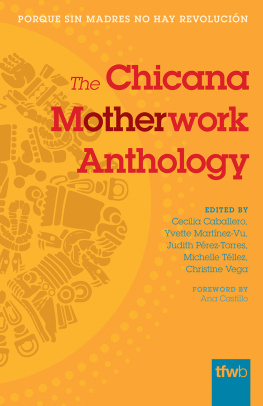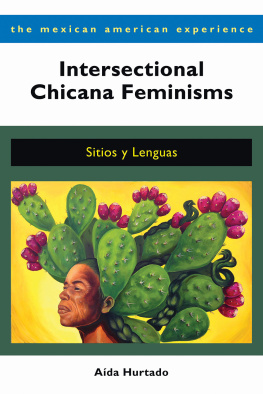Chicana Without Apology
Chicana sin vergenza
Chicana Without Apology
Chicana sin vergenza
The New Chicana Cultural Studies
By
Edn E. Torres
ROUTLEDGE
NEW YORK AND LONDON
Published in 2003 by
Routledge
29 West 35th Street
New York, NY 10001
www.routledge-ny.com
Published in Great Britain by
Routledge
11 New Fetter Lane
London EC4P 4EE
www.routledge.co.uk
Copyright 2003 by Routledge
Routledge is an imprint of the Taylor & Francis Group.
Printed in the United States of America on acid-free paper.
All rights reserved. No part of this book may be reprinted or reproduced or utilized in any form or by any electronic, mechanical, or other means, now known or hereafter invented, including photocopying and recording, or in any information storage or retrieval system, without permission in writing from the publishers.
10 9 8 7 6 5 4 3 2 1
Library of Congress Cataloging-in-Publication Data
Torres, Edn E.
Chicana without apology=Chicana sin vergenza : the new Chicana cultural studies / by Edn E. Torres.
p. cm.
Includes bibliographical references and index.
ISBN 0-415-93505-9 (alk. paper) ISBN 0-415-93506-7 (pbk. : alk. paper)
1. Mexican American womenStudy and teaching. 2. Mexican American womenSocial conditions. 3. Mexican American womenEthnic identity. 4. Social actionUnited States. 5. FeminismUnited States. I. Title: Chicana sin vergenza. II. Title.
E184.M5T67 2003
305.48'86872073dc21
2003006004
Para mi mam
Contents
I owe tremendous thanks to my research assistant Heidi Schumacher, (and all of the people she enlisted to help her). Looking up the citations for the footnotes alone was a daunting task and I am grateful for all the late nights. I want to thank the Department of Womens Studies at the University of Minnesota and Amy Katz Kaminsky for giving me the time to complete this manuscript. I am forever grateful to Dr. Nancy (Rusty) Barcel and the Presidents Multicultural Grant for supporting my research. Rusty, you arrived at this University just in time to push me out of my complacency and onto the faculty full time. Thank you so much for your encouragement, inspiration, and your practical help. To Elisa Facio, who spent so much time making sure this book got published, a lifetime of love and gratitude. Muchas gracias to professors Dionicio Nodn Valds, Guillermo Rojas, and Jacqueline Zita who read and critiqued two of the chapters in their infancy. Your analytical comments, critical questions, and valuable insights pushed me to think in greater depth about our relationships to power in varying contexts. A mi comadre y prima, Susana De Len, te quiero mucho, mujer. Tu sabes, sin t en mi vida, no hay corazn mexica. Muchisimas gracias por ti y tu familiaespecialmente las mujeres, Patti, Idalia, Chita, Angelica, Citlali, y Tita. Thanks to many of my students who have inspired me in ways they could not foresee. Most of all thanks to mi pap chulo, Michael, who started me on this educational journey and withstood its demands with more unselfishness than I had any right to ask or accept. I will always love you for this gift.
No hay tiempo ni espacio para llorar
There Is neither Time nor Space to Cry
I have spent the past fifteen years trying to negotiate the complex relationship between theory and my daily life. But I think the disjuncture between what I read and what I live began long before that. Books captured me when I was in the sixth grade. And though I loved the rhythm and flow of words, nothing I found in the many libraries I visited described my life. In junior high, I began to find African American writers, and the world suddenly opened. My wounds became visible for the first time. Many of the things I suspected about white folks, but could not voice, came off those pages and told me I was neither crazy nor alone. The civil rights movement was well under way by then. I was thrilled by the defiance and horrified by the responses of local, state, and federal police.
Though I strongly identified with black folks and their struggle, I knew the experiences of African Americans were not mine. It was just close enough to teach me a great deal about who I was in relationship to power. Some of my earliest memories have to do with white people calling me namesmany I didnt understand. They were never spoken in Spanish. But I knew from the hateful tone in their voices and the meanness on their faces that they meant for me to know I was less than nothing. All of this would have been hard enough in south Texas where I would have been surrounded by my Mexican family and all the Chicanitos who made up the majority of the neighborhood and the schools. But by 1965 I was living in rural Minnesota. I made it through high school hanging on to the words of black Nationalists por la vida. In a few years, I would move to Minneapolis, to find not only other Mexican Americans, but also a movement of my own. Obviously, this book is an extension of that politic.
My intention has always been to broaden the scope of cultural studies discussions and practices. Some of these essays are more conventional than others. But my heart belongs to those parts of the text that are the least academic. These unexpected ways of expressing my ideas reflect both my nature (as an abstract, random thinker), and my training in several interdisciplinary programsChicano studies, womens studies, and American studies. But they also sometimes rise up out of this well of knowledge that was left to me by my grandmothers and great aunts. Thus, I have always tried to focus on issues of acute importance to Mexican American women. I have to confess, though, that I do sometimes stray from this center in an effort to provide general insights for all people interested in forming successful coalitions for radical political work.
Following the advice of several wise Chicana mentors, I have taken theories and concepts from a wide range of disciplines and combined them with the lessons Ive learned through observation and experience. What emerges as I close my eyes to compose, listening to the voices of all the precious women in my life, is the theory and language of struggle and endurance. Though I have tried to write an academically rigorous book, there are moments when I simply must be poetic, because the emotion of those voices will not settle for simple rationality. And though I have tried to embrace the notion of multiplicity whenever I can, this is an unapologetic challenge to the traditions and systems that have tried to silence Chicanas and so many others. It makes visible to agents and targets alike the real damage to, and strength of, those who fight back.
I am old enough to have absorbed the passion and rhetorical strategies of El Movimiento firsthand, but young enough as a scholar to move toward wide-reaching coalition politics. I am quite sure that readers will have no trouble finding instances where I seem to contradict myself. I have made my peace with such ambiguity and hope that these contradictions will simply encourage lively discussions of the issues among readers. This is not to imply that these contradictions are frivolous. On the contrary, they symbolize ideas and questions too complex and significant to be easily decided or succinctly articulated. I would only ask that you keep in mind as you sort through these seeming contractions that both ideas might be true in a given context or in answering competing theoretical questions.





